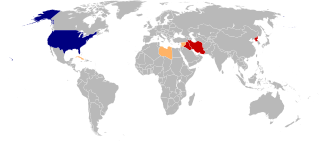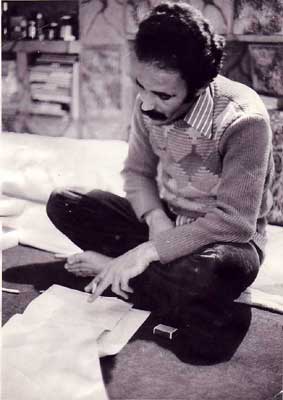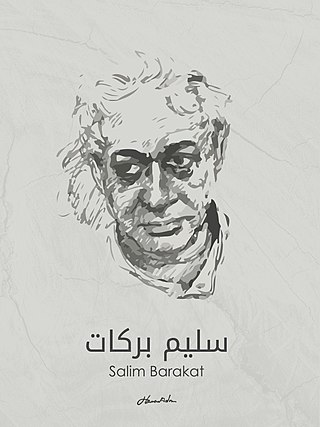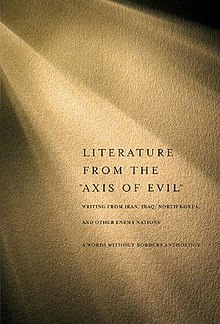
The phrase "axis of evil" was first used by U.S. President George W. Bush and originally referred to Iran, Iraq, and North Korea. It was used in Bush's State of the Union address on January 29, 2002, less than five months after the 9/11 attacks and almost a year before the 2003 invasion of Iraq, and often repeated throughout his presidency. He used it to describe foreign governments that, during his administration, allegedly sponsored terrorism and sought weapons of mass destruction.
A fictional book is a text created specifically for a work in an imaginary narrative that is referred to, depicted, or excerpted in a story, book, film, or other fictional work, and which exists only in one or more fictional works. A fictional book may be created to add realism or depth to a larger fictional work. For example, George Orwell's novel Nineteen Eighty-Four has excerpts from a book by Emmanuel Goldstein entitled The Theory and Practice of Oligarchical Collectivism which provides background on concepts explored in the novel.

Holidays in the Danger Zone: Holidays in the Axis of Evil is a two part travel documentary on all of the countries in U.S. President George W. Bush's "Axis of evil", part of the Holidays in the Danger Zone series, produced and broadcast by BBC Correspondent. Written and presented by Ben Anderson, the series was first broadcast on 31 January 2003 from 2250 GMT on BBC Four.

Korean literature is the body of literature produced by Koreans, mostly in the Korean language and sometimes in Classical Chinese. For much of Korea's 1,500 years of literary history, it was written in Hanja. It is commonly divided into classical and modern periods, although this distinction is sometimes unclear. Korea is home to the world's first metal and copper type, the world's earliest known printed document and the world's first featural script.
Minfong Ho is a Chinese–American writer. Her works frequently deal with the lives of people living in poverty in Southeast Asian countries. Despite being fiction, her stories are always set against the backdrop of real events, such as the student movement in Thailand in the 1970s and the Cambodian refugee problem with the collapse of the Khmer Rouge regime at the turn of the 1970s and 1980s. Her simple yet touching language and her optimistic themes have made her writing popular among children as well as young adults.

Malay Roy Choudhury was an Indian Bengali poet, playwright, short story writer, essayist and novelist who founded the Hungryalist movement in the 1960s.

Houshang Golshiri was an Iranian fiction writer, critic and editor. He was one of the first Iranian writers to use modern literary techniques, and is recognized as one of the most influential writers of Persian prose of the 20th century.

Houshang Moradi Kermani is an Iranian writer best known for children's and young adult fiction. He was a finalist in 2014 for the Hans Christian Andersen Award.
Sudanese literature consists of both oral as well as written works of fiction and nonfiction that were created during the cultural history of today's Republic of the Sudan. This includes the territory of what was once Anglo-Egyptian Sudan, the independent country's history since 1956 as well as its changing geographical scope in the 21st century.

Reading is a popular pastime in North Korea, where literacy and books enjoy a high cultural standing, elevated by the regime's efforts to disseminate propaganda as texts. Because of this, writers are held in high prestige.

Algerian literature has been influenced by many cultures, including the ancient Romans, Arabs, French, Spanish, and Berbers. The dominant languages in Algerian literature are French and Arabic.

Lullabies from the Axis of Evil (2004) is an album collecting traditional lullabies sung by women from Iraq, Iran, and North Korea, as well as Syria, Libya, and Cuba, plus Afghanistan and Palestine, mixed with Western performers singing translated versions of the songs.
Hong Sok-jung (Korean: 홍석중), born in Seoul in 1941, is a North Korean writer. He is the grandson of novelist Hong Myong-hui.
Syrian literature is literature originating from present-day Syria, and which may be written in any of the languages of Syria. Syrian literature has been influenced by the country's political history and by Arabic and French literature.
Libyan literature has its roots in Antiquity, but contemporary Libyan writing draws on a variety of influences.
Kabita Sinha (1931–1999) was a Bengali poet, novelist, feminist and radio director. She is noted for her modernist stance, rejecting the traditional housebound role for Bengali women, a theme echoed later in the work of other poets including Mallika Sengupta and Taslima Nasrin.

Salim Barakat is a Kurdish-Syrian novelist and poet. He is considered one of the most innovative poets and novelists writing in Arabic and has published numerous novels, poetry collections, biographies and children's books, some of which have been translated into English, French, German, Swedish and other languages.
Ashraf Dali is an Egyptian poet, novelist and journalist. He was born in Banha, Egypt on March 13, 1963. He is the Acting President of the AJA. Ashraf Dali won the Manhae Prize in Literature 2014. Since 1989, when his first book of poetry was published, Ashraf Aboul-Yazid has been keen to introduce himself as a man of words. He won the Arab Journalism Award in Culture, in 2015, given by Dubai Press Club, UAE, for his work published in Al-Arabi magazine, The Art of Miniature in Literature, History and Myth.
Majid's Tales or The Tales of Majid is a collection of short stories by Iranian author Houshang Moradi Kermani. Many years before it became a book, it was a radio program script (1974). In 1985, the script was adapted into a book and published. The main character, Majid, is an orphan who lives with his grandmother in the city of Kerman, Iran. The book includes 39 chapters detailing the adventures, misadventures, and coming-of-age milestones from the perspective of this Iranian teenager attending the first year of high school. Majid works in a bakery during the summer and sometimes after school in order to supplement the money that his grandmother receives from her deceased husband's retirement funds. There are some similarities between the fictional character, Majid, and Kermani. For example, Majid is an orphan, while in real life, Kermani lost his mother when he was young. Additionally, Majid and Kermani do not have any siblings and lived in poverty while growing up. It was in this state of solitude and loneliness that Kermani began to write.

Tarek Eltayeb is an Egyptian-Sudanese writer. He was born to Sudanese parents in Cairo, and has been a resident of the Austrian capital Vienna since 1984. He studied Social and Economic Sciences at the Vienna University of Economics and Business Administration, and is currently professor at the International Management Center/University of Applied Sciences in Krems, Austria.










